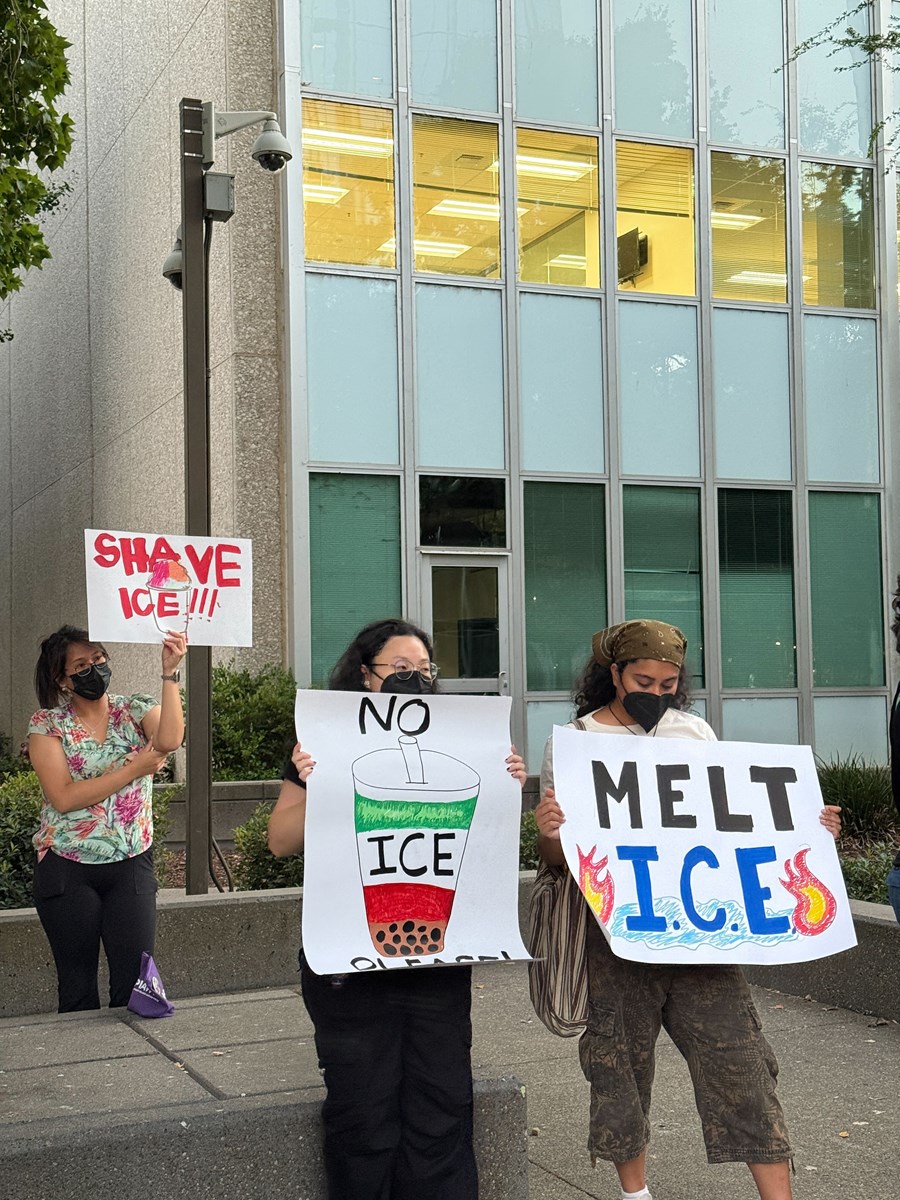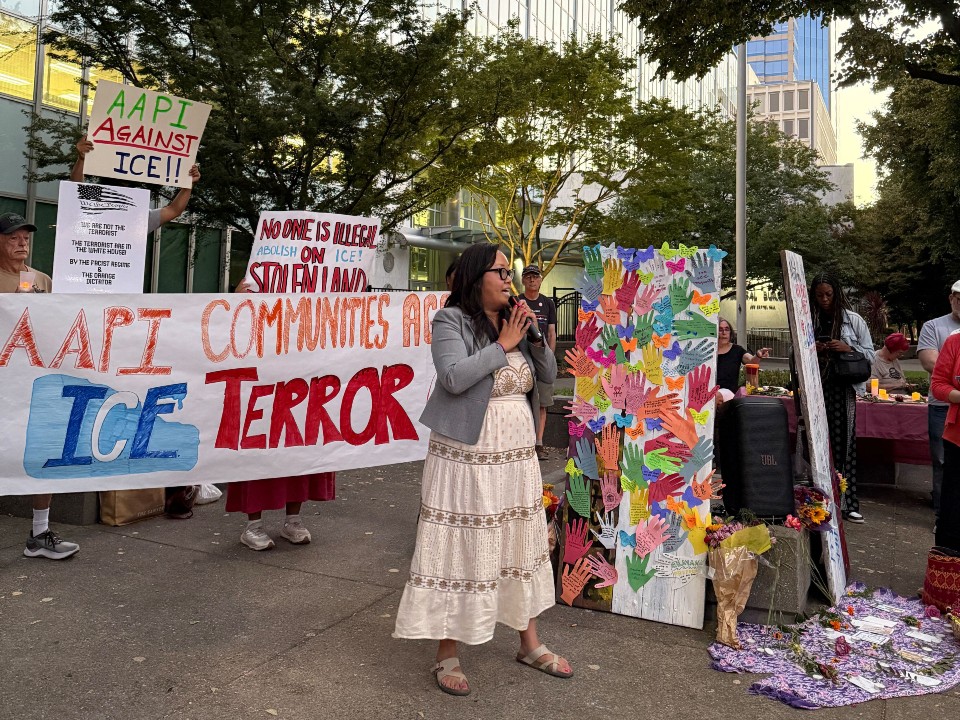Federal immigration raids and detentions have struck fear into immigrant and refugee communities across the country, including in Sacramento.
Local officials are challenging these actions, which have resulted in dozens of reported detentions at the John E. Moss Federal Building in downtown.
The Sacramento City Council and county supervisors sent a letter Tuesday to the San Francisco Immigration and Customs Enforcement Field Office requesting access to the John E. Moss Federal Building after receiving reports of people being detained overnight and experiencing “abhorrent conditions.”
Democratic Congresswoman Doris Matsui also sent a letter Wednesday to ICE demanding entry into the Sacramento building, saying its conditions do not comply with national detention standards. Matsui said today she was barred from entering the federal building.
Much of this enforcement action, and resulting media coverage, has focused on Latinos, but Asian Americans and Pacific Islanders have also been swept up in the federal crackdowns.
This week, several AAPI organizations and leaders held a vigil outside the federal building in Sacramento to raise awareness.
Sacramento District 8 Councilmember Mai Vang was among the speakers. She along with Nancy Xiong, Executive Director of Hmong Innovating Politics spoke with Insight host Vicki Gonzalez about how local Asian American communities are navigating this time of fear and uncertainty.
This conversation has been edited for length and clarity
Interview highlights
There’s been a lot of detentions during routine immigration hearings, outside of Home Depot, targeting street vendors in recent months. What would you too like people to understand about how this enforcement is impacting the Asian-Americans and Pacific Islander communities in our area?
VANG: First let me just say when we talk about deportation, this is an issue that impacts all of our communities, and our struggles are so interconnected. Our Latino community is enduring so much in this moment, and I also just want to say to them that we are with you in this fight.
As a daughter of Hmong refugees, the fight is personal for me. This year in particular actually marks the 50th anniversary since Southeast Asians [have] been in the United States, and so many of our families were forced to flee from persecution and then resettled here as refugees seeking safety and a new beginning.
My family and so many other Southeast Asian families were placed in under-resourced and high-poverty neighborhoods, oftentimes with little to no support, and that put some of our siblings, our uncles on a path from poverty to prisons. We’re seeing ICE continuing to detain [and] deport immigrant refugees who actually have already served their time.
I know that as society, as an American, we value our working families. We value second chances and in this moment, so many of them are being separated from their loved ones often without due process or the basic protections that every family deserves in this country.
Does immigration enforcement present differently for Asian Americans, when compared to other communities?
XIONG: For sure. Oftentimes in the media, we don’t really see these massive raids that happen in LA or other bigger cities, it’s been very targeted. We had a community member up in North Sac who was just watering their lawn and got picked up, got kidnapped and detained by ICE.
There’s a level of erasure happening…people are not talking about it, and because it’s not these massive raids, there’s not a lot of stories around how it’s impacting the Southeast Asian, Hmong, community. We are seeing this happen time and time again whether they go to their ICE check-in, or there’s this very ambiguous letter that they need to check in on, and they’re getting detained right away.
We’re picking up on the patterns and we really want to highlight that, because it’s not just happening in raids. It’s just really unfortunate, not being able to really showcase the stories of our communities and how it’s impacting them.
VANG: I think there is this myth, the model minority myth, in our mainstream community that Asian Americans, Pacific Islanders, native Hawaiians, Southeast Asians, they’re doing well. That when there are rules and regulations and policies that are implemented, that they don’t get impacted. We know that’s simply not true.
If you look at the disaggregated data, the income inequality, at the ways in which ICE have targeted… you see a discrepancy [and] inequities that happen in our Asian American Pacific Islander communities. Folks would think, “oh Asian Americans, they’re doing great,” they’re not being impacted by this. But our communities are being impacted by it and often behind the scene, invisible.
Do you have an idea if enforcement or detentions have increased recently?
VANG: Talking to advocates, organizations on the ground doing the work, we know that in this past May there [were] over 150. I was at a pardon refugee event, and they talked about [how] last month there [were] 70. They’re estimating over 500 Southeast Asian deportations, but that’s probably an undercount because we actually don’t have anyone tracking this. This is through rapid response.
City and county officials have sent a letter to ICE about conditions inside the federal building in downtown Sacramento. Representative Matsui had also demanded a tour of the facility. What have you heard about the detainment or arrests of individuals here in Sacramento, and the conditions inside this facility?
XIONG: What I’ve been hearing is that folks are sleeping on the ground. There’s not space for them to really rest. They’re not getting fed consistently, they’re not given water consistently. That’s what we’ve been hearing on the ground and it’s really worrisome. Just even being at the vigil, I’m staring at this building and I can’t imagine folks being treated so inhumanely in that building.
Trump and ICE, they’re not following the law. There’s no due process, the way that they’ve been treating folks has been really inhumane. We’re on the outside, and we’re trying to bring more voices from the inside… what they’ve been experiencing. It’s just been really incredibly hard to hear, and not be able to do anything about it.
Councilmember Vang, have you heard anything from the local ICE district office?
VANG: Not yet. We submitted a letter requesting for an investigation [and] for a tour. It was a letter by Supervisor Phil Serna, Mayor Pro Tem Eric Guerra, signed by the mayor and council. But I think the larger issue here is the ways in which ICE is being used to harm and to separate our families. We sent this letter, it’s a great first start. But I think it’s really important… that there is some congressional oversight of what’s happening in the ICE office in Sacramento.
 Protesters hold signs calling attention to ongoing federal immigration actions that are impacting Asian American and Pacific Islander communities Aug. 19, 2025.Courtesy of Nancy Xiong
Protesters hold signs calling attention to ongoing federal immigration actions that are impacting Asian American and Pacific Islander communities Aug. 19, 2025.Courtesy of Nancy Xiong
This should not be happening to our immigrant and refugee communities. This administration is talking about detaining and deporting the worst criminals in this country, and we know that is simply not true. And they’re also making a profit out of these deportations. Let’s have a real conversation about that. Absolutely I’m concerned about the conditions of our immigrant refugees who are detained in our Sacramento ICE building, but the larger fight is really dismantling ICE overall and the harm it has caused in this country.
For many immigrants or refugees English is often not their first language, and there are many languages spoken within AAPI populations. This can create language barriers when detentions and enforcement is happening. How are you addressing that?
VANG: As local elected officials, we’ve got a lean on our community partners and our trusted messengers on the ground. We recently did a ‘know your rights’ workshop and we didn’t put that on social media – we shared it with our elders, with trusted messengers. We had over a hundred people that showed up.
And oftentimes even in different languages, we don’t have words to explain… that will translate “ICE” or what’s happening. Oftentimes we’re describing the situation in our language, so ensuring that we have interpreters on site to support our diverse community is of the most importance. That’s the reason why we have to have a wide coalition.
The City of Sacramento this year dedicated $500,000 to support the FUEL Network [for] legal services and for local organizations to do this work, but it’s not enough. The need is so dire.
There isn’t necessarily consensus or an agreement within the Asian American community or other immigrant groups about what’s happening. Some approve of ramped-up enforcement or support ICE. What are those conversations like within the local AAPI community?
XIONG: When one of my staff [was] speaking to her mom about this, she shared that her mom knows that what’s happening is not right. Even if she doesn’t understand what the policy or the law is, the way that ICE has been kidnapping folks and detaining and deporting them… in those instances with that understanding of what’s happening, the violence and the harm that ICE is causing… folks are seeing that and know that it’s wrong. I think that is what has been really driving our conversations.
Councilmember Vang, what would you say to the people that aren’t offended by, or against the enforcement that’s happening?
VANG: What I’ve said to those members is that we are living in a moment that is incredibly dangerous… where our values are being tested, where we stand for our families [and] communities and across this country. I say to them that no one is safe, no community is safe, no city is safe. Whether you’re a citizen, no matter your status, you are not safe. We are seeing students with visas, who are here legally, who are being detained by speaking truth to power. We have U.S. citizens who are being detained, folks on visas that have not committed a crime that are being detained.
Now more than ever we have to stay united to really fight against the administration because they’re not following the books. They are targeting based on race, no matter your status. They’re eventually going to come for someone you love.
President Trump did earn the popular vote, which includes people who are Asian American. How do you navigate those conversations during this time?
VANG: I have family members that voted for Trump, and I understand why. It’s because the establishment hasn’t served our community. No matter if you’re a Democrat or you’re a Republican, every single one of our family members, our loved ones, our neighbors deserve the right to have enough food to eat, to quality health care, a place to call home and to be with their families. And we know that under both administrations we’re seeing our family suffering. Their vote for Trump was out of that frustration.
When you share with them that their critical programs [like] SNAP, Medicaid [are] being cut, that this big ugly bill is the largest wealth transfer ever in our country, that so many of our families and loved ones are going to suffer because of this, then they see it and they understand.
As leaders locally we have to hold the line, but we also have to hold space and have those conversations. I would say the status quo politics and the establishment have failed… that is why we are here today. But it’s so important now more than ever that we have fighters, people who are speaking up and informing our communities of the harms… so we ensure we don’t have this administration in power ever again.
